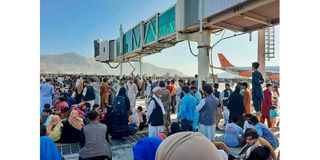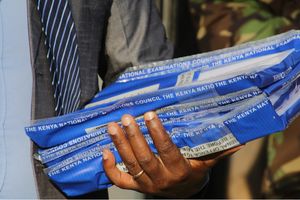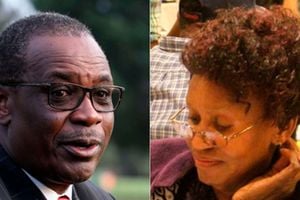I felt like a bird in a cage, we left Kabul on a military plane

Afghans crowd at the tarmac of the Kabul airport on August 16, 2021, to flee the country as the Taliban took control of Afghanistan.
What you need to know:
- Zahra Joya, 29, is a journalist who lived under the Taliban’s Islamic Emirate of Afghanistan in Kabul for two weeks.
- Until the morning of Sunday, of August 15, (the day Kabul fell to the Taliban), the city was full of women in colourful dresses, adding so much life to the city, but suddenly they were nowhere.
- She had to make sure they were not publishing anything in Rukhshana that would catch the attention of the Taliban
This story was produced in partnership with Rukhshana Media and is part of The Fuller Project’s ongoing series, Ending America’s forever war: What is next for Afghan women?, documenting what the end of America’s longest war on foreign soil means for the women who have lived through it.
I have lost count of the number of days and weeks since that Sunday, when Kabul fell to the Taliban.
Everything seems to have faded away and I feel like I’m drowning in a wave of despair. I know I am not alone in feeling this way. Anyone connected to this land is full of despair.
I lived under the Taliban’s Islamic Emirate of Afghanistan in Kabul for two weeks. This is my experience.
Throughout this time, people’s lives were disrupted, especially those who worked for the government and international organizations. During these two weeks, I struggled with many problems, but the thing that pained me the most was seeing my father get anxious. He was so sleep deprived, and I worried he might get sick again.
For several days, I stayed in my room. I’m a journalist, so I needed to keep working. I kept calling different sources to get news updates so we could share them with the readers of Rukhshana Media.
During the two weeks of living under the Taliban, we were overtaken by an overwhelming fear. It was so intense that none of us dared report on what was actually happening. I felt suffocated. Not only had I lost my right to work and walk around the city freely, but I had to make sure we were not publishing anything in Rukhshana that would catch the attention of the Taliban.
I only took a taxi twice during this time. Each time I needed to leave home, it was difficult finding clothes that fit the Taliban’s standard of “Islamic Sharia”. For the first time ever, my parents and siblings were thinking about my clothes, asking, “What is suitable for Zahra now?”
In the 28 years of my life, I never once thought of buying those long black robes.
Kabul population
So, I left the house in my normal clothes, but promised my parents that I wouldn’t walk anywhere, not be on the streets. When I first left the house, in a car, I noticed despair and frustration everywhere, overshadowing the Kabul population. The Taliban’s white flags were flying in the wind in various parts of the city — a constant reminder that they had seized power.
The presence of women in public places and on the streets was almost non-existent.
Until the morning of Sunday, of August 15, (the day Kabul fell to the Taliban), the city was full of women in colourful dresses. They added so much life to the city, but suddenly they were nowhere, the city had been emptied out. I saw a few women outside with a mahram (male relative escort). It was as though I had travelled back in time, to the 1990s when the Taliban last ruled, banning women from public events.
It was as if history had lost its meaning: 1996 could not be distinguished from 2021.
Suddenly, it didn’t matter if I was a young woman in 2021. My fate was no different from that of a woman who lived in Kabul in 1996.
According to Taliban law, women have only two choices: either accept their oppressive laws and live by them, totally changing your identity, or live as they did and get killed. For me, as a person who struggled and worked so hard in a patriarchal society to get where I am, both options are unacceptable.
For years, my eyes freely looked at the hills of Kabul, taking in its mud houses and wildflowers. I will not accept having to see the world through the prison bars of a burqa.
Normal days
During the days that I lived under the dark shadow of the Taliban, I felt like a bird in a cage. Like a bird with wings, but no permission to fly.
I used to work outside the home, in my office, from morning until evening, all week. Friday was the only day you’d find me at home. But since the Taliban took over, I was forced to stay at home. When I realized there was nothing I could do to fix the situation, I walked around our yard.
My mother tried to comfort me and told me to hope that normal days would return. But she, too, knew that life would not be normal for women any time soon. Late into the first week of living in Taliban-controlled Kabul, I heard they were going house to house looking for journalists and activists. My family insisted that I change home for a bit.
One of the days the following week, I received a call from the British Embassy. They asked me to head towards Camp Baron as soon as I received a confirmation email from them. My sisters and I left our home for the airport within three hours of receiving the email. When I said goodbye to my father outside the airport in the crowd, I didn’t get to hug him. I held and kissed my mother, who was determined to come with us to the airport.
When we reached the southern gate of Hamid Karzai International Airport, we encountered a huge crowd. The airport was surrounded by thousands of Afghans, tired of war and hoping to escape and get a chance to survive. Everyone was anxiously waiting to enter the airport. Taliban fighters sporting long hair and loose clothes beat people with sticks and water pipes to try and establish order.
Hitting people
When we realized that we couldn’t enter Camp Baron, we changed route. This time, we tried getting in through a narrow and dodgy alley called Zuhak. We made it to the gate of Camp Baron, but the crowd was huge. There didn’t seem to be space to throw a needle, let alone humans. Women, men, the elderly, the youths, and children were all trying to enter the camp.
Under the burning sun, my sisters and I waited for more than two hours in the crowd. Even though I was sweating nonstop, something in me became frozen. I started to shiver as the moments passed, as if I were cold.
The Taliban continued hitting people. Every once in a while, a few lucky privileged people would drive up and were escorted through by members of the Taliban. When the gates opened, chaos would ensue amongst the crowd. The Taliban opened fire to scatter and separate the crowd. It got closer and closer to us.
As night fell and it got dark, the crowd got bigger. We spoke to a woman headed to Camp Baron, who suggested it was better to enter via Abbey Gate. Getting to Abbey Gate meant going through dirty sewage. It was intolerable. Out of desperation, many people had actually thrown themselves into the middle of the sewage, trying to get the attention of the foreign soldiers who stood by the side.
Burst into tears
“Go die in the sewage!” some of the foreign soldiers would shout back to them. Seeing that level of helplessness and humiliation, I burst into tears. I began screaming in pain. The men around me tried to comfort me.
“My dear sister, don’t cry,” one told me. “Your sorrow isn’t greater than mine. And if I start crying, there will be no one to comfort me.”
After four hours of hassle, we finally managed to get near a British soldier. When we showed him the email and our documents, he let us in. We spent 24 hours waiting in Camp Baron. The next night, at 3am, we left Kabul on a military plane.
On board there were 300 people with broken and painful hearts. Before we took off, as the plane stood still in Kabul, my chest was so heavy and I felt I couldn’t breathe. Then, once in the sky, I slowly cried for the duration of the three-hour flight. There were no windows, so I didn’t get to see my beautiful Kabul for the last time, to say farewell. From where I was sitting, I could only see the sleepy and sad, exhausted faces of my fellow evacuees.
What a tragic and mournful sight!
Zahra Joya, 29, is the founder and editor of Rukhshana Media.




